Capacity-building for the Bacteriology-Virology Laboratory at Fann University Hospital
Capacity-building for the Bacteriology-Virology Laboratory at Fann University Hospital
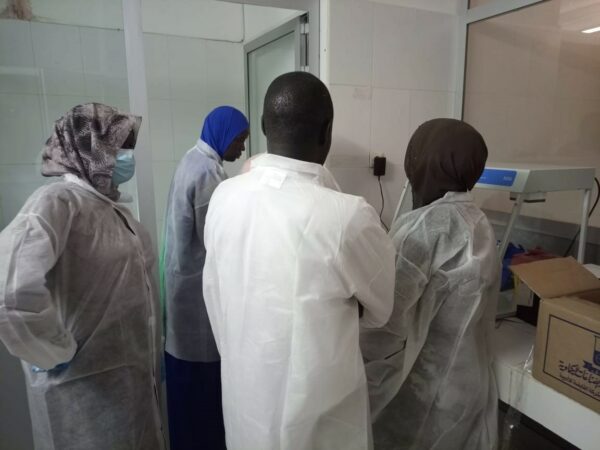
As part of its efforts to build capacity for sequencing and genomic surveillance of SARS-CoV-2 and emerging pathogens in West and Central Africa, the AFROSCREEN project is supporting 3 health facilities in Senegal: the Fann University Hospital, the Dalal Jamm Hospital and the Institut Pasteur de Dakar.
The Bacteriology-Virology Laboratory of the Pneumology Department of the CHU de Fann benefited from capacity building to carry out sequencing tests, with three components: (i) refurbishment of the laboratory, (ii) acquisition of a sequencer and equipment, and (iii) staff training in sequencing.
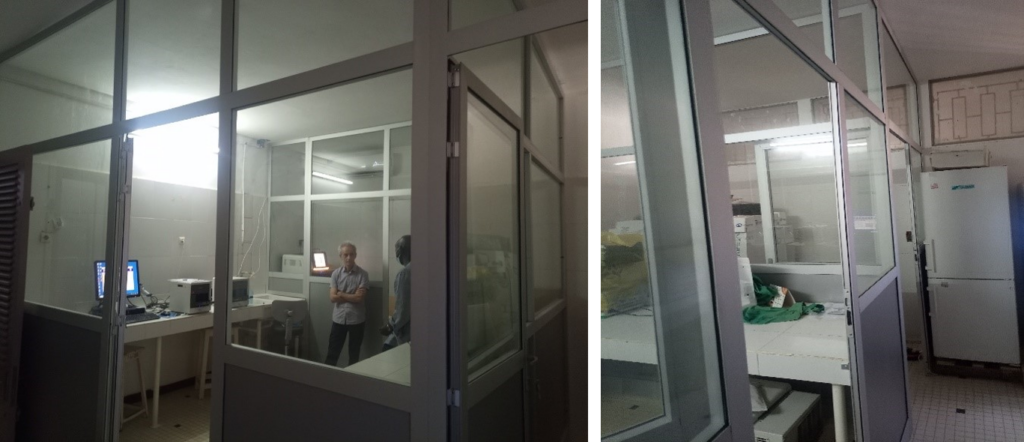
The Bacteriology-Virology Laboratory of the Pneumology Department at Fann University Hospital has been refurbished to meet the standards required for molecular biology activities. The old premises were partitioned to provide a sampling room, an extraction room, a PCR mix preparation room, an amplification room and a sequencing room. Ainsi, des cloisonnements ont été effectués au niveau des anciens locaux pour pouvoir disposer d’une salle de prélèvement, d’une salle d’extraction, d’une salle de préparation des mix de PCR, d’une salle d’amplification et d’une salle de séquençage.
Subsequently, the AFROSCREEN project provided the laboratory with an iSeq 100 sequencer (Illumina) and equipment for molecular biology testing, including fume hoods, centrifuge, freezer, pipette sets, etc.
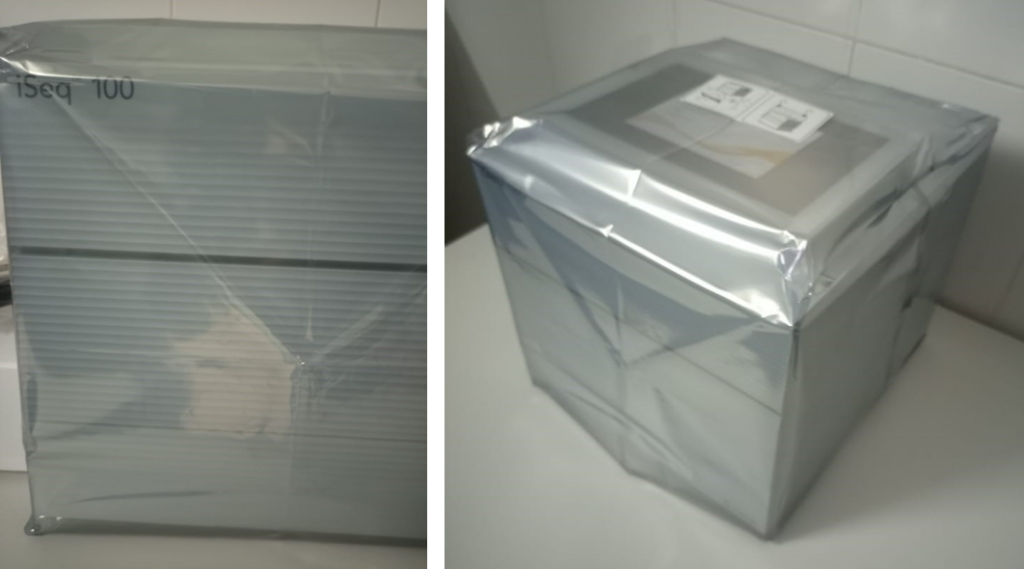
In October 2023, SSM Group, Illumina’s distributor in Senegal, installed the machine and trained staff in sequencing. The training was carried out in two parts:
- The first part was theoretical, covering the guidelines, principles and methodologies used to carry out Illumina sequencing tests.
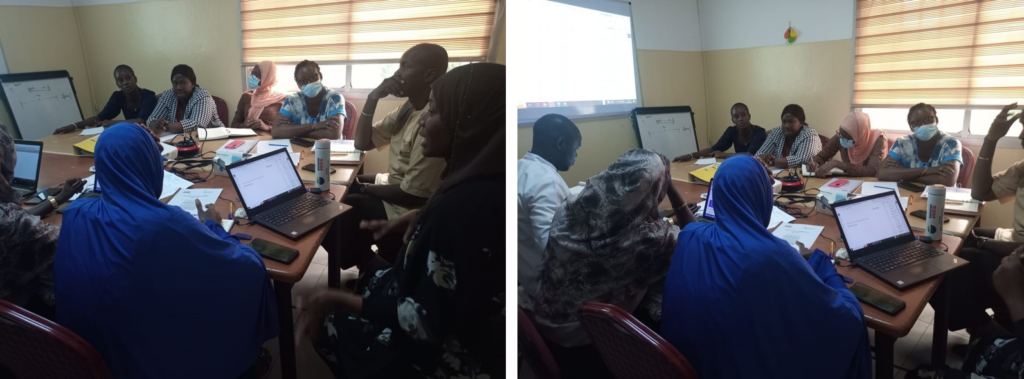
- A second practical phase was carried out in the laboratory, with the tests performed under the supervision of the SSM engineer.
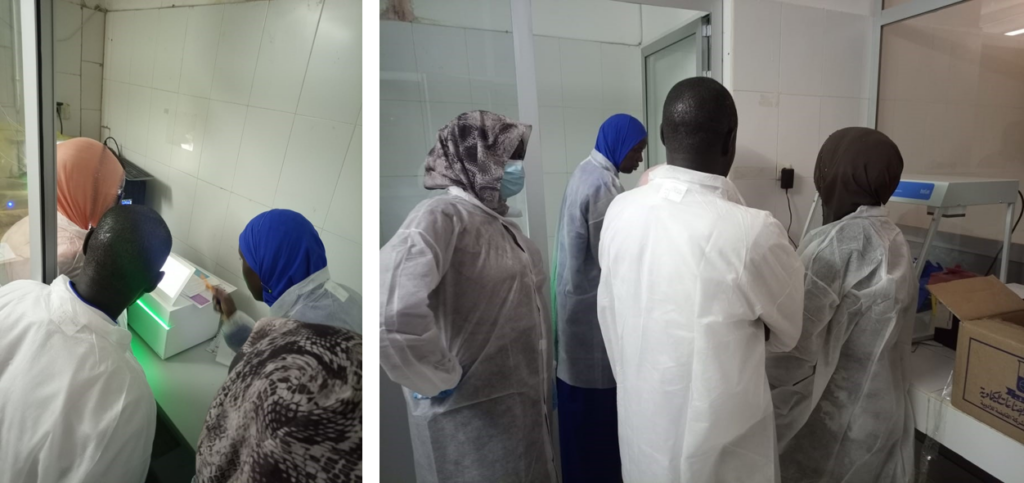
At the end of the training, an assessment of knowledge was carried out by the trainer. An evaluation of the training was also carried out by the trained staff.
Capacity building will enable the Bacteriology-Virology Laboratory at CHU de Fann to retrospectively describe the circulation of SARS-CoV-2 variants during the pandemic period, based on samples taken in the laboratory. In addition, the laboratory will be able to sequence chronic infections, such as HIV and viral hepatitis, as well as carry out genomic surveillance for the monitoring of antimicrobial resistance and emerging pathogens.
As part of its efforts to build capacity for sequencing and genomic surveillance of SARS-CoV-2 and emerging pathogens in West and Central Africa, the AFROSCREEN project is supporting 3 health facilities in Senegal: the Fann University Hospital, the Dalal Jamm Hospital and the Institut Pasteur de Dakar.
The Bacteriology-Virology Laboratory of the Pneumology Department of the CHU de Fann benefited from capacity building to carry out sequencing tests, with three components: (i) refurbishment of the laboratory, (ii) acquisition of a sequencer and equipment, and (iii) staff training in sequencing.

The Bacteriology-Virology Laboratory of the Pneumology Department at Fann University Hospital has been refurbished to meet the standards required for molecular biology activities. The old premises were partitioned to provide a sampling room, an extraction room, a PCR mix preparation room, an amplification room and a sequencing room. Ainsi, des cloisonnements ont été effectués au niveau des anciens locaux pour pouvoir disposer d’une salle de prélèvement, d’une salle d’extraction, d’une salle de préparation des mix de PCR, d’une salle d’amplification et d’une salle de séquençage.
Subsequently, the AFROSCREEN project provided the laboratory with an iSeq 100 sequencer (Illumina) and equipment for molecular biology testing, including fume hoods, centrifuge, freezer, pipette sets, etc.

In October 2023, SSM Group, Illumina’s distributor in Senegal, installed the machine and trained staff in sequencing. The training was carried out in two parts:
- The first part was theoretical, covering the guidelines, principles and methodologies used to carry out Illumina sequencing tests.

- A second practical phase was carried out in the laboratory, with the tests performed under the supervision of the SSM engineer.

At the end of the training, an assessment of knowledge was carried out by the trainer. An evaluation of the training was also carried out by the trained staff.
Capacity building will enable the Bacteriology-Virology Laboratory at CHU de Fann to retrospectively describe the circulation of SARS-CoV-2 variants during the pandemic period, based on samples taken in the laboratory. In addition, the laboratory will be able to sequence chronic infections, such as HIV and viral hepatitis, as well as carry out genomic surveillance for the monitoring of antimicrobial resistance and emerging pathogens.